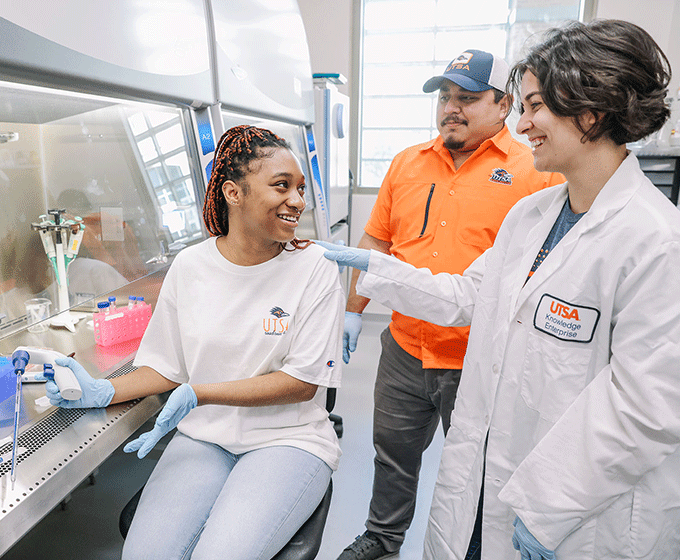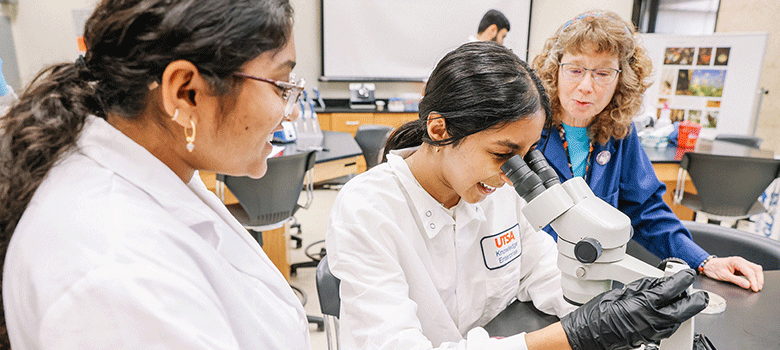
OCTOBER 13, 2023 — UTSA advanced in its position among universities worldwide and improved its research and industry scores in Times Higher Education’s 2024 World University Rankings. UTSA ranked 114th out of 169 U.S. universities, up 20 places over last year. In the world, UTSA is placed within the 501-600 bracket.
The annual rankings examine 1,904 schools from 108 countries. The publication uses five pillars to measure an institution’s excellence: research quality, international outlook, industry, research environment and teaching.
“UTSA remains steadfast on its journey to becoming a great public research university focused on driving San Antonio’s knowledge economy, living out the notion that great universities need great cities and great cities need great universities,” said UTSA President Taylor Eighmy. “Over the last decade, we’ve worked diligently to grow our federal portfolio and foster and create new strategic partnerships that connect academia to public and private industries to advance our research footprint. We’re honored for the recognition of this work and look forward to building even more pathways of success for our faculty, students and strategic partners.”
Among UT System institutions, UT Austin held the highest spot, coming in at No. 52. UTSA did, however, outrank UT Arlington (601-800), UT El Paso (801-1000) and UT Rio Grande Valley (1201-1500). UTSA’s rank was also higher than Texas Tech University and Baylor University, which placed within the 601-800 bracket, and Texas State University (1001-1200).

UTSA had its most significant performance increase in research quality, advancing from a score of 69 in 2023 to 79.2. The research quality pillar, which makes up 30% of an institution’s overall score, is based on a university’s impact in spreading new knowledge and ideas.
To determine a university’s score, Times Higher Education reviewed over 134 million citations across 16.5 million journal articles, article reviews, books and book chapters, and conferences over a five-year period.
“UTSA’s advanced standing demonstrates its growing role as an institution with Carnegie R1 classification,” said Nicole Beebe, strategic research development interim associate vice president and assistant vice president for faculty research development in the UTSA Office for Research, Economic Development, and Knowledge Enterprise (REDKE). “UTSA’s growth demonstrates the success of the intentional steps the university took to align university resources, support of faculty and its ability to expand and leverage strategic partnerships.”
For example, UTSA is a founding member of the Alliance of Hispanic Serving Research Universities. The alliance includes 21 of the nation’s Hispanic Serving Carnegie R1 research institutions that work collaboratively to advance the professoriate and humanities scholarship. The alliance also works to expand opportunities in research and industries that have traditionally excluded diverse voices.
The university has also been able to improve its research quality by recruiting and retaining high-quality faculty. In 2019, the Division of Academic Affairs launched its Strategic Faculty Hiring Initiative to recruit some of the most promising and accomplished faculty from diverse backgrounds and experiences.
UTSA’s 2023 faculty cohort best represents the culmination of faculty recruitment efforts. Within the cohort, 87% of the 46 incoming tenured and tenure-track faculty received their terminal degrees from Carnegie R1 research institutions and 63% of the tenured/tenure track faculty earned their degrees from the Association of American Universities (AAU) member institutions.
Once they arrive at the university, UTSA ensures faculty are supported and empowered in their academic instruction and research activity. UTSA provides faculty with career and research support services, mentorship, professional development and student engagement opportunities.
Additionally, faculty are encouraged to work with peers across colleges and disciplines in curricula and research development. The university has also heavily invested in cutting-edge facilities like San Pedro I, home of the School of Data Science and the National Security Collaboration Center, to provide opportunities for faculty to create new partnerships with industry.
These efforts have enabled UTSA to rapidly advance in its journey to be the next great public research university in one of the fastest-growing cities in the U.S. and with extraordinary opportunities for collaborative research with public and private partners across many industries.
“From cybersecurity to biomedical and health sciences, UTSA is well-positioned to address the world’s grandest challenges as an urban-serving, multi-cultural discovery enterprise,” Beebe said.
UTSA also improved its score across other areas, with the sharpest increase in the industry pillar, where it went from a score of 39 to 63 in the latest Times Higher Education’s rankings. This criterion, which makes up 4% of a university’ score, measures how an institution’s research is impacting the industry—from encouraging the development of new inventions and patents to sparking innovation.
Times Higher Education is the latest organization to recognize UTSA’s research industry impact. In 2022, the National Academy of Inventors and the Intellectual Property Owners Association placed the UT System at No. 3 for U.S. patents granted worldwide. That year, UTSA contributed 10.3% of total patents issued to the UT System.
UTSA received an international outlook score of 42.8, an increase of nearly five points since the 2023 ranking. The international outlook pillar gauges a university’s effectiveness to attract students and faculty from all over the world. To calculate this score, Times Higher Education reviews a university’s publications that feature an international co-author and takes into account the volume of such publications.
The university also increased slightly in its research environment score to 22.5 from 21.5 in 2023. The score compares a university’s research quality to its peers, accounting for differences in discipline, industry, levels of available staff support, and size of grants and awards for specific fields.
The teaching pillar reflects an institution’s results in the Times Higher Education’s annual Academic Reputation Survey of 68,000 cited academics worldwide. The survey results are then balanced to create a representative distribution of disciplines and countries. The resulting scores demonstrate a university’s available infrastructure as well as its ability to produce and effectively develop the next generation of academics. In this pillar, UTSA received a score of 21.
The Times Higher Education World University Rankings has published its annual list of rankings since 2004.
UTSA Today is produced by University Communications and Marketing, the official news source of The University of Texas at San Antonio. Send your feedback to news@utsa.edu. Keep up-to-date on UTSA news by visiting UTSA Today. Connect with UTSA online at Facebook, Twitter, Youtube and Instagram.
Move In To COLFA is strongly recommended for new students in COLFA. It gives you the chance to learn about the Student Success Center, campus resources and meet new friends!
Academic Classroom: Lecture Hall (MH 2.01.10,) McKinney Humanities BldgWe invite you to join us for Birds Up! Downtown, an exciting welcome back event designed to connect students with the different departments at the Downtown Campus. Students will have the opportunity to learn about some of the departments on campus, gain access to different resources, and collect some giveaways!
Bill Miller PlazaCome and celebrate this year's homecoming at the Downtown Campus with food, games, giveaways, music, and more. We look forward to seeing your Roadrunner Spirit!
Bill Miller PlazaThe University of Texas at San Antonio is dedicated to the advancement of knowledge through research and discovery, teaching and learning, community engagement and public service. As an institution of access and excellence, UTSA embraces multicultural traditions and serves as a center for intellectual and creative resources as well as a catalyst for socioeconomic development and the commercialization of intellectual property - for Texas, the nation and the world.
To be a premier public research university, providing access to educational excellence and preparing citizen leaders for the global environment.
We encourage an environment of dialogue and discovery, where integrity, excellence, respect, collaboration and innovation are fostered.